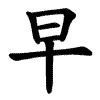早
- early;
- to be early;
- morning;
Etymology
There are two main interpretations of the character’s formation:
1. Ideogrammatic compound
Composed of 日 (sun) and 十, which some scholars interpret as an early form of 甲 (the first heavenly stem, “first / beginning”).
Thus, 日 + 甲 (十) symbolizes “the first appearance of the sun” — the dawn, or the early morning.
2. Phono-semantic compound
Other analyses see it as 日 (sun) providing meaning and 棗 (jujube) providing the sound zǎo, evolving through 朿 → 十 simplification.
Both theories ultimately converge on the notion of beginning, first light, or the early stage of time.
Usage in Korean
이를 조 / 일찍 조 (早) — to be early
조조 (早朝) — early morning; dawn assembly
조숙 (早熟) — precocity, early development
조혼 (早婚) — early marriage
In Korean, 早 is used both literally (“early in time”) and metaphorically (“early maturity, early success”).
Additional notes
In classical poetry and daily speech alike, 早 symbolizes renewal, readiness, and diligence.
The “early rising” sun embodies a moral ideal — a person who rises early is one who prepares, strives, and acts with purpose.
早起三光 (Those who rise early receive three blessings) — a saying that valorizes early effort.
早春 (early spring) — denotes youth and vitality, the freshness before full bloom.
早朝之士 (scholars of the dawn) — a poetic expression for those who dedicate themselves to study and duty from early morning hours.
In Confucian ethos, 早 represents not merely time but discipline — to act before necessity, to move before opportunity fades.
